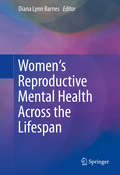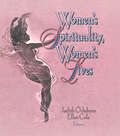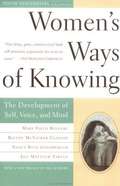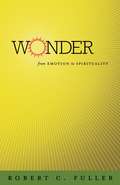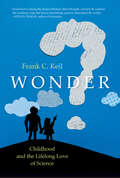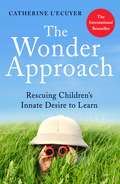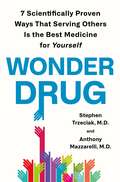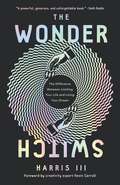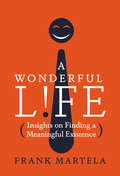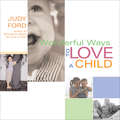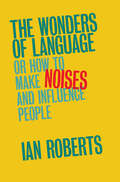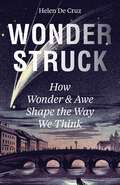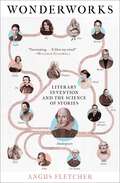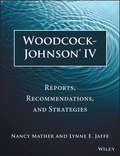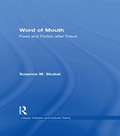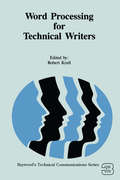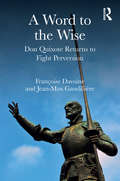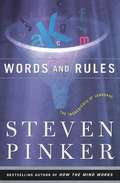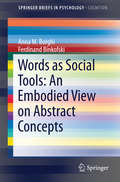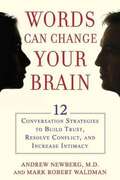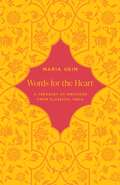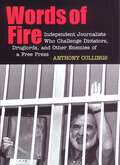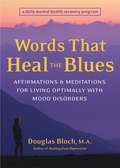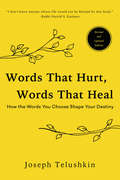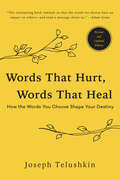- Table View
- List View
Women's Reproductive Mental Health Across the Lifespan
by Diana Lynn Barnes"In this book you'll find a thoughtfully edited chronicle of the unique convergence of genetic, hormonal, social, and environmental forces that influence a woman's mental health over the course of her life. Both comprehensive and nuanced, Women's Reproductive Mental Health Across the Lifespan captures the science, clinical observation, and collective wisdom of experts in the field. Professionals and laypersons alike are well-advised to make room on their bookshelves for this one!"-Margaret Howard, Ph. D. , Warren Alpert Medical School of Brown University; Women & Infants Hospital, Providence RI"This outstanding collection of work is an important, timely, and much needed resource. Dr. Diana Lynn Barnes has been instrumental in bringing attention to the needs of perinatal women for decades. In Women's Reproductive Health Across the Lifespan, she brilliantly unites the medical world of reproductive life events with the psychiatric and psychological world of mental health issues associated with them. Her expertise, combined with contributions by distinguished leaders in the field, create a volume of work that should be studied carefully by every medical and mental health provider who works with women. "-Karen Kleiman, MSW, The Postpartum Stress Center, Author of Therapy and the Postpartum Woman"Finally, a book that addresses the entire scope of women's reproductive mental health spanning the gamut from puberty to menopause. The list of chapter contributors reads like a who's who of international experts. Unique to this book is its focus on the interaction of genetics, hormonal fluctuations, and the social environment. It is a must addition for the libraries of clinicians and researchers in women's reproductive mental health". -Cheryl Tatano Beck, DNSc, CNM, FAAN, Board of Trustees Distinguished Professor, School of Nursing, University of ConnecticutPregnancy and childbirth are generally viewed as joyous occasions. Yet for numerous women, these events instead bring anxiety, depression, and emotional distress. Increased interest in risk reduction and early clinical intervention is bringing reproductive issues to the forefront of women's mental health. The scope of Women's Reproductive Mental Health across the Lifespan begins long before the childbearing years, and continues well after those years have ended. Empirical findings, case examples, and dispatches from emerging areas of the field illuminate representative issues across the continuum of women's lives with the goal of more effective care benefitting women and their families. Chapter authors discuss advances in areas such as fertility treatment and contraception, and present current thinking on the psychological impact of pregnancy loss, menopause, cancer, and other stressors. These expert contributors emphasize the connections between an individual's biology and psychology and cultural expectations in shaping women's mental health, and the balance between a client's unique history and current clinical knowledge clinicians need to address disorders. Included in the coverage:-The experience of puberty and emotional wellbeing. -Body image issues and eating disorders in the childbearing years. -Risk assessment and screening during pregnancy. -Normal and pathological postpartum anxiety. -Mood disorders and the transition to menopause. -The evolution of reproductive psychiatry. A reference with an extended shelf life, Women's Reproductive Mental Health across the Lifespan enhances the work of researchers and practitioners in social work, clinical psychology, and psychiatry, and has potential relevance to all health care professionals.
Women's Spirituality, Women's Lives
by Ellen Cole Judith OchshornThis enlightening book examines how the feminist spirituality movement contributes to the establishment of new paradigms of mental health for women. Women’s Spirituality, Women’s Lives examines possible psychotherapeutic implications for women engaged in feminist spirituality and stimulates much-needed conversation between feminist therapists and feminist theologians/ritualists. Feminist spirituality is part of the current broad challenge to accepted ways of knowing and being. This book argues that as women tell their own stories, they create rituals that enable them to feel a sense of control over the future and to move toward a kind of authority, agency, and autonomy associated with mental health and psychological well-being. Women from many cultural backgrounds and religious perspectives have embraced alternative forms of spiritual expression, based on profound theoretical challenges to mainstream religious beliefs, ranging from calls for the radical reclamation and reconstruction of religious traditions to personal involvement in goddess worship and Wicca. Women’s Spirituality, Women’s Lives presents theoretical, conceptual, and experiential chapters that analyze the extent to which these proliferating women’s groups represent the beginnings of new norms of mental health for women.Women’s Spirituality, Women’s Lives presents a variety of voices, including Native American, Christian, Jewish, and Wiccan. Chapters are divided into three sections--Laying the Groundwork, Theoretical Challenges, and Living It Out--and explore a diverse array of topics such as: the “shouting” church and Black women’s mental health a traditionalist Native American challenge to New Age cooptation a feminist group and Jewish women’s self-identity lesbian altar-making and mental health feminist Wicca in the U.S. and Germany the martial arts and women’s mental health the use of feminist rituals in therapy and as therapyFeminist therapists and theologians, as well as other individuals interested in feminist spirituality or alternative spirituality, will find this book a fascinating exploration of the various aspects of the spirituality of women. Women’s Spirituality, Women’s Lives is also an excellent reader to expand the thinking of students in classes in women’s studies and religious studies.
Women's Ways of Knowing: The Development of Self, Voice, and Mind
by Mary Field Belenky Blythe Mcvicker Clinchy Nancy Rule Goldberger Jill Mattuck TaruleDespite the progress of the women's movement, many women still feel silenced in their families and schools. This moving and insightful bestseller, based on in-depth interviews with 135 women, explains why they feel this way. Updated with a new preface exploring how the authors' collaboration and research developed, this tenth anniversary edition addresses many of the questions that the authors have been asked repeatedly in the years since Women's Ways of Knowing was originally published.
Wonder
by Robert C. FullerThe attempt to identify the emotional sources of religion goes back to antiquity. In an exploration that bridges science and spirituality, Robert C. Fuller makes the convincing case that a sense of wonder is a principal source of humanity's belief in the existence of an unseen order of life. Like no other emotion, Fuller argues, wonder prompts us to pause, admire, and open our hearts and minds.With a voice that seamlessly blends the scientific and the contemplative, Fuller defines wonder in keeping with the tradition of Socrates--as an emotion related to curiosity and awe that stimulates engagement with the immediate physical world. He draws on the natural and social sciences to explain how wonder can, at the same time, elicit belief in the existence of a more-than-physical reality. Chapters examining emotions in evolutionary biology and the importance of wonder in human cognitive development alternate with chapters on John Muir, William James, and Rachel Carson, whom Fuller identifies as "exemplars of wonder." The writings and lives of these individuals express a functional side of emotion: that the very survival of life on earth today may depend on the empathy, compassion, and care that are aroused by a sense of wonder.Forging new pathways between the social sciences, philosophy, belief, and cultural history, Wonder deepens our understanding of the complex sources of personal spirituality and fulfillment.Bridging science and spirituality, Robert Fuller makes the convincing case that a sense of wonder is a principal source of humanity's belief in the existence of an unseen order of life. Like no other emotion, he argues, wonder prompts us to pause, admire, and open our hearts and minds. Chapters examining emotions in evolutionary biology and the importance of wonder in human cognitive development alternate with chapters on John Muir, William James, and Rachel Carson, whom Fuller identifies as "exemplars of wonder." The writings and lives of these individuals express a functional side of emotion: that the very survival of life on earth today may depend on the empathy, compassion, and care that are aroused by a sense of wonder.-->
Wonder: Childhood and the Lifelong Love of Science
by Frank C. KeilHow we can all be lifelong wonderers: restoring the sense of joy in discovery we felt as children.From an early age, children pepper adults with questions that ask why and how: Why do balloons float? How do plants grow from seeds? Why do birds have feathers? Young children have a powerful drive to learn about their world, wanting to know not just what something is but also how it got to be that way and how it works. Most adults, on the other hand, have little curiosity about whys and hows; we might unlock a door, for example, or boil an egg, with no idea of what happens to make such a thing possible. How can grown-ups recapture a child&’s sense of wonder at the world? In this book, Frank Keil describes the cognitive dispositions that set children on their paths of discovery and explains how we can all become lifelong wonderers. Keil describes recent research on children&’s minds that reveals an extraordinary set of emerging abilities that underpin their joy of discovery—their need to learn not just the facts but the underlying causal patterns at the very heart of science. This glorious sense of wonder, however, is stifled, beginning in elementary school. Later, with little interest in causal mechanisms, and motivated by intellectual blind spots, as adults we become vulnerable to misinformation and manipulation—ready to believe things that aren&’t true. Of course, the polymaths among us have retained their sense of wonder, and Keil explains the habits of mind and ways of wondering that allow them—and can enable us—to experience the joy of asking why and how.
The Wonder Approach: Rescuing Children's Innate Desire to Learn
by Catherine L'Ecuyer'This book is a must-read for parents and educators who want to refocus children's attention to one of the greatest secrets to long-term happiness - discovering the extraordinary in the ordinary' - Jessica Joelle Alexander, co-author of The Danish Way of ParentingChildren of the last twenty years have grown up in an increasingly frenzied and demanding environment so that, on one hand, education has been rendered more complicated, and on the other, the essentials have been lost to view. In order to ensure their future success, parents often feel that they must fill their children's schedules with endless activities that cause leisure, spontaneous activity, and the experience of nature, beauty and silence, to fade out of their lives.This veritable race toward adulthood distances children more and more from the natural laws of childhood. A constant stream of loud and flashy stimuli disturbs the only true and sustainable learning that exists in them: that of calmly and quietly discovering the world for themselves and at their own pace, with a sense of wonder that goes beyond mere curiosity for the unknown or interest in novelty.In a world such as this, it can be a daunting task for a parent or educator of young children to discern how to best raise their children. Catherine L'Ecuyer offers clarity, drawing attention to the findings of many studies of the last few decades on the effects of screen use, overstimulation and mechanistic approaches to education on young children, and suggests time exploring the real world, more silence and the 'Wonder Approach' as remedies. Learning should be a wondrous journey guided by a deep reflection on what the natural laws of childhood require: respect for children's pace and rhythms, innocence, sense of mystery and thirst for beauty.
Wonder Drug: 7 Scientifically Proven Ways That Serving Others Is the Best Medicine for Yourself
by Stephen Trzeciak M.D. Anthony Mazzarelli M.D.A pair of doctors team up to illuminate, through neuroscience and captivating stories from their clinical practice, how serving others—and pitching in to the world in general—is a secret superpower.If a doctor’s prescription could bring you:- Longer life- Better health- More energy and resilience- Less burnout, depression and anxiety- More happiness, fulfillment and well-being- More personal and professional success (including higher income)- And, no harmful side effectsWould you take it? In Wonder Drug, physician scientists Stephen Trzeciak, M.D., and Anthony Mazzarelli, M.D., illuminate, through neuroscience and captivating stories from their clinical practices, how being a giving, other-focused person is a secret superpower. Serving others—and pitching in to the world in general—is the evidence-based way to live your life. Kinder people not only live longer, they also live better. Science shows that serving others is not just the right thing to do, it’s also the smart thing to do. Wonder Drug will make you rethink your notions of “self-care” and “me time,” and realize that focusing on others is a potent antidote to the weariness that so many of us feel in modern times. Getting outside of your own head, outside the swirl of self-concern that may dominate your mental chatter, is, ironically, one of the best things you can do for yourself. Building upon their earlier work showing that, in the context of healthcare, having more compassion for patients is a powerful way to not only achieve better patient outcomes, but also promote well-being, resilience and resistance to burnout among healthcare workers, Trzeciak and Mazzarelli now extend their research to uncover how the power of serving others reaches far beyond the medical world and can be a life-changing therapy for everyone. Wonder Drug relates to the varying meanings of giving in real people’s daily lives. The stories in this book will convince and inspire you to make simple prism changes. You don’t need a total life upheaval, just a purposeful shift in mindset. In fact, the crucial first piece of the evidence-based prescription is this: start small. Per science, the best way to well-being and finding your true fulfillment is this: scan your orbit for the people around you in need of help, and go fill that need, as often as you can.
The Wonder Switch: The Difference Between Limiting Your Life and Living Your Dream
by Harris III"A powerful, generous and unforgettable book." - Seth Godin"A wondrous lens on healing ourselves and our world in this strangest and hardest of times." - Krista TippettWe are all born with the wonder switch in the "on" position, but somewhere along the way, our wonder is crushed. And that's when we begin to live out of a self-limiting mindset that shuts down our sense of possibility and purpose.Yet reclaiming your wonder--and with it, your life--is within reach. In The Wonder Switch, join world-renowned storyteller and professional illusionist Harris III in a journey to bring you back to the magic you fear you've lost--not the sleight of hand he performs across world stages, but real magic: love, hope, joy, belonging, meaning, and purpose.One of wonder's greatest powers is that it changes the stories we tell ourselves, writes Harris. With the help of his power-packed Transformation Map, you'll gain the tools you need to switch from the old story that leaves you unfulfilled to the new story that will make you a healthier, happier, all-around better human being.In this book, you'll discover:The surprising science behind the stories we tell ourselves and how they shape our livesPractices for "righting" your story from a broken narrative to a restored narrativeThe secret to breaking out of a Limiting Mindset and developing a Wonder MindsetPractices for moving from complacency to curiosityWhy worry is a misuse of your imagination, and how to kick the habit
A Wonderful Life: Insights on Finding a Meaningful Existence
by Frank Martela PhDIn a series of essays that explore the notion of what brings significance to our existences, clarifying why we have this longing beyond the present moment and an insatiable dissatisfaction with where we are, scholar Frank Martela tackles the subject of finding meaning in life. With beautiful decorative elements and an engaging design, the book approaches its subject in a readily digestible form. It grapples with some of life’s most pressing questions, like "Is happiness a worthy goal?" and "What is the foundation for meaning in a secular society?" and "Is life an existential void?" yet Martela answers these questions and more in a relaxed, conversational tone and with a wry sense of humor, placing some of life’s greatest philosophical concerns and quandaries into a modern-day context. Martela quickly and concisely gets to the heart of the matter: your place in the world and how to find meaning in life as countless thinkers and philosophers have done before, yet the emphasis here is on what we do with the life we have and how we can make it more meaningful. Part prescriptive and part armchair philosophy book, A Wonderful Life is accessible to everyone, from the well-read scholar to the apprentice as well as anyone curious about how to extract the greatest meaning and sense of purpose from their existence.
Wonderful Ways to Love a Child: Even When It Seems Impossible (Wonderful Ways)
by Judy FordA Powerful Lesson on Unconditional Love and How to Raise Happy ChildrenThis collection of essays offers a gentle guide on how to put a parent's love into daily actions. A parent’s calling is to raise a person. By making loving actions part of your life, you have the power to build the kind of family unit most people long for. Wonderful Ways to Love a Child is filled with true stories of parents and children who are nurturing strong and loving families. The book provides the support that empowers you to be the parent you want to be and expands your parenting skills.No simple tricks. Cultivating a loving relationship with your child demands integrity, compassion, and emotional honesty. It is a forever commitment to continuous loving actions–even when you are too tired. This low-stress approach to positive parenting produces happy children with high self-esteem. This is how children succeed.A perfect gift for new parents. Wonderful Ways to Love a Child is a prescription to strengthen family bonds that will last a lifetime. There are many different parenting styles–this one is based in love and logic, and positive discipline. Learn to put yourselves in your children’s shoes–and have fun in the process.In this book you’ll discover guides to:Loving yourself and allowing your child to love themselvesGiving the gift of your presence and being open to the miracle of transformationSaying yes as often as possible, and knowing when to say noTeaching that all feelings are acceptable and making room for the CrankiesDelighting in silliness by laughing, dancing and singing togetherTeaching values by exampleOther essential tools to ensure a loving, lasting friendship with your children–and make them want to come visit when they are olderIf you enjoyed parenting books such as How to Talk so Kids Will Listen and How to Listen so Kids Will Talk, 1-2-3 Magic, or Parenting with Love and Logic, you’ll love Wonderful Ways to Love a Child.
The Wonders of Language
by Ian RobertsIan Roberts offers a stimulating introduction to our greatest gift as a species: our capacity for articulate language. We are mostly as blissfully unaware of the intricacies of the structure of language as fish are of the water they swim in. We live in a mental ocean of nouns, verbs, quantifiers, morphemes, vowels and other rich, strange and deeply fascinating linguistic objects. This book introduces the reader to this amazing world. Offering a thought-provoking and accessible introduction to the main discoveries and theories about language, the book is aimed at general readers and undergraduates who are curious about linguistics and language. Written in a lively and direct style, technical terms are carefully introduced and explained and the book includes a full glossary. The book covers all the central areas of linguistics, including phonetics, phonology, morphology, syntax, semantics and pragmatics, as well as historical linguistics, sociolinguistics and psycholinguistics.
Wonderstruck: How Wonder and Awe Shape the Way We Think
by Helen De CruzA philosopher explores the transformative role of wonder and awe in an uncertain worldWonder and awe lie at the heart of life&’s most profound questions. Wonderstruck shows how these emotions respond to our fundamental need to make sense of ourselves and everything around us, and how they enable us to engage with the world as if we are experiencing it for the first time.Drawing on the latest psychological insights on emotions, Helen De Cruz argues that wonder and awe are emotional drives that motivate us to inquire and discover new things, and that humanity has deliberately nurtured these emotions in cultural domains such as religion, science, and magic. Tracing how wonder and awe unify philosophy, the humanities, and the sciences, De Cruz provides new perspectives on figures such as Plato, Aristotle, Adam Smith, William James, Rachel Carson, Maurice Merleau-Ponty, Jean-Paul Sartre, and Abraham Heschel. Along the way, she explains how these singular emotions empower us to be open-minded, to experience joy and hope, and to be resilient in the face of personal troubles and global challenges.Taking inspiration from Descartes&’s portrayal of wonder as &“that sudden surprise of the soul,&” this illuminating book reveals how wonder and awe are catalysts that can help us reclaim what makes life worth living and preserve the things we find wonderful and valuable in our lives.
Wonderworks: Literary Invention and the Science of Stories
by Angus FletcherThis &“fascinating&” (Malcolm Gladwell, New York Times bestselling author of Outliers) examination of literary inventions through the ages, from ancient Mesopotamia to Elena Ferrante, shows how writers have created technical breakthroughs—rivaling scientific inventions—and engineering enhancements to the human heart and mind.Literature is a technology like any other. And the writers we revere—from Homer, Shakespeare, Austen, and others—each made a unique technical breakthrough that can be viewed as both a narrative and neuroscientific advancement. Literature&’s great invention was to address problems we could not solve: not how to start a fire or build a boat, but how to live and love; how to maintain courage in the face of death; how to account for the fact that we exist at all.Wonderworks reviews the blueprints for twenty-five of the most significant developments in the history of literature. These inventions can be scientifically shown to alleviate grief, trauma, loneliness, anxiety, numbness, depression, pessimism, and ennui, while sparking creativity, courage, love, empathy, hope, joy, and positive change. They can be found throughout literature—from ancient Chinese lyrics to Shakespeare&’s plays, poetry to nursery rhymes and fairy tales, and crime novels to slave narratives.A &“refreshing and remarkable&” (Jay Parini, author of Borges and Me: An Encounter) exploration of the new literary field of story science, Wonderworks teaches you everything you wish you learned in your English class, and &“contains many instances of critical insight....What&’s most interesting about this compendium is its understanding of imaginative representation as a technology&” (The New York Times).
Woodcock-Johnson IV: Reports, Recommendations, and Strategies
by Nancy Mather Lynne E. JaffeIncludes online access to new, customizable WJ IV score tables, graphs, and forms for clinicians Woodcock-Johnson IV: Reports, Recommendations, and Strategies offers psychologists, clinicians, and educators an essential resource for preparing and writing psychological and educational reports after administering the Woodcock-Johnson IV. Written by Drs. Nancy Mather and Lynne E. Jaffe, this text enhances comprehension and use of this instrument and its many interpretive features. This book offers helpful information for understanding and using the WJ IV scores, provides tips to facilitate interpretation of test results, and includes sample diagnostic reports of students with various educational needs from kindergarten to the postsecondary level. The book also provides a wide variety of recommendations for cognitive abilities; oral language; and the achievement areas of reading, written language, and mathematics. It also provides guidelines for evaluators and recommendations focused on special populations, such as sensory impairments, autism, English Language Learners, and gifted and twice exceptional students, as well as recommendations for the use of assistive technology. The final section provides descriptions of the academic and behavioral strategies mentioned in the reports and recommendations. The unique access code included with each book allows access to downloadable, easy-to-customize score tables, graphs, and forms. This essential guide Facilitates the use and interpretation of the WJ IV Tests of Cognitive Abilities, Tests of Oral Language, and Tests of Achievement Explains scores and various interpretive features Offers a variety of types of diagnostic reports Provides a wide variety of educational recommendations and evidence-based strategies
Word of Mouth: Food and Fiction After Freud (Literary Criticism and Cultural Theory)
by Susanne M. SkubalFirst Published in 2002. Routledge is an imprint of Taylor & Francis, an informa company.
Word Processing for Technical Writers (Baywood's Technical Communications Ser.)
by Robert KrullSupports the idea of matching the "system" to the technical writer's needs. This book contains numerous questions and answers.
A Word to the Wise: Don Quixote Returns to Fight Perversion
by Françoise Davoine Jean-Max GaudillièreAfter giving us a fascinating reading of Cervantes' classic novel in Don Quixote: Fighting Melancholia, Françoise Davoine and Jean-Max Gaudillière co-author a second work, to reflect on the hero's battle against perversion. To do so, they retrace his adventures in the Cervantes' second Don Quixote, written ten years after the first. The authors follow in his footsteps as he embarks on this other extraordinary journey in which perversion is laid bare for all to see, creating not only a powerful social link, but even a form of government. Cervantes shows us how madness acts as a means to confront it: here again, the field of action presented to the reader is explored in rigorous detail. The reliability of this strategy derives from the power of the given word, which has to oppose lies, seduction, secrets, trickery and crime, in order to confer authenticity to what madness reveals.
Words and Rules: The Ingredients of Language
by Steven PinkerPinker (psychology, MIT) explains the mysteries of language, such as why languages change over time and how children learn their native language, by dissecting the idea that language comprises a mental dictionary of memorized words and a mental grammar of creative rules. Pinker connects a remarkable number of topics such as the attempts to simulate language using computers; the nature of human concepts; the peculiarities of the English language; and the theories of Noam Chomsky, through a minute dissection of the phenomenon of regular and irregular verbs. Annotation c. Book News, Inc., Portland, OR (booknews.com)
Words as Social Tools: An Embodied View on Abstract Concepts
by Anna M. Borghi Ferdinand BinkofskiHow are abstract concepts and words represented in the brain? That is the central question addressed by the authors of "Words as Social Tools: An Embodied View on Abstract Concepts". First, they focus on the difficulties in defining what abstract concepts and words are, and what they mean in psycholinguistic research. Then the authors go on to describe and critically discuss the main theories on this topic with a special emphasis on the different embodied and grounded theories proposed in cognitive psychology within the last ten years, highlighting the advantages and limitations of each of these theories. The core of this Brief consists of the presentation of a new theory developed by the authors, the WAT (Words As social Tools) view, according to which both sensorimotor (such as perception, action, emotional experiences) and linguistic experiences are at the basis of abstract concepts and of abstract word representation, processing and use. This theory assigns a major role to acquisition: one of the assumptions the authors make is that the different ways in which concrete and abstract words are acquired constrain their brain representation and their use. This view will be compared with the main existing theories on abstractness, from the theory of conceptual metaphors to the theories on multiple representation. Finally, the volume illustrates recent evidence from different areas (developmental, behavioral, cross-cultural, neuropsychological and neural) which converge with and support the authors' theory, leading to the conclusion that in order to account for representation and processing of abstract concepts and words, an extension of embodied and grounded theories is necessary.
Words Can Change Your Brain: 12 Conversation Strategies to Build Trust, Resolve Conflict, and Increase Intimacy
by Andrew Newberg Mark Robert WaldmanIn our default state, our brains constantly get in the way of effective communication. They are lazy, angry, immature, and distracted. They can make a difficult conversation impossible. But Andrew Newberg, M.D., and Mark Waldman have discovered a powerful strategy called Compassionate Communication that allows two brains to work together as one.<P><P> Using brainscans as well as data collected from workshops given to MBA students at Loyola Marymount University, and clinical data from both couples in therapy and organizations helping caregivers cope with patient suffering, Newberg and Waldman have seen that Compassionate Communication can reposition a difficult conversation to lead to a satisfying conclusion. <P>Whether you are negotiating with your boss or your spouse, the brain works the same way and responds to the same cues. The truth, though, is that you don't have to understand how Compassionate Communication works. You just have to do it. Some of the simple and effective takeaways in this book include: * Make sure you are relaxed; yawning several times before (not during) the meeting will do the trick * Never speak for more than 20-30 seconds at a time. After that they other person's window of attention closes. * Use positive speech; you will need at least three positives to overcome the effect of every negative used * Speak slowly; pause between words. This is critical, but really hard to do. * Respond to the other person; do not shift the conversation. * Remember that the brain can only hold onto about four ideas at one time Highly effective across a wide range of settings, Compassionate Communication is an excellent tool for conflict resolution but also for simply getting your point across or delivering difficult news.
Words for the Heart: A Treasury of Emotions from Classical India
by Maria HeimA richly diverse collection of classical Indian terms for expressing the many moods and subtleties of emotional experienceWords for the Heart is a captivating treasury of emotion terms drawn from some of India’s earliest classical languages. Inspired by the traditional Indian genre of a “treasury”—a wordbook or anthology of short texts or poems—this collection features 177 jewel-like entries evoking the kinds of phenomena English speakers have variously referred to as emotions, passions, sentiments, moods, affects, and dispositions. These entries serve as beautiful literary and philosophical vignettes that convey the delightful texture of Indian thought and the sheer multiplicity of conversations about emotions in Indian texts. An indispensable reference, Words for the Heart reveals how Indian ways of interpreting human experience can challenge our assumptions about emotions and enrich our lives.Brings to light a rich lexicon of emotion from ancient IndiaUses the Indian genre of a “treasury,” or wordbook, to explore the contours of classical Indian thought in three of the subcontinent’s earliest languages—Sanskrit, Pali, and PrakritFeatures 177 alphabetical entries, from abhaya (“fearlessness”) to yoga (“the discipline of calm”)Draws on a wealth of literary, religious, and philosophical writings from classical IndiaIncludes synonyms, antonyms, related words, and suggestions for further readingInvites readers to engage in the cross-cultural study of emotionsReveals the many different ways of naming and interpreting human experience
Words of Fire: Independent Journalists who Challenge Dictators, Drug Lords, and Other Enemies of a Free Press
by Anthony C. CollingsIf journalism is the first draft of history, then independent journalists are surely its most daring composers. Along such celebrated and high-profile figures as Christiane Amanpour and Wolf Blitzer, there exists a stratum of journalistsself-employed, working under dire conditions, and with minimal resourceswho often place themselves at ground zero of world events. In this gripping account, Anthony Collings takes us into the world of independent journalists, and the daily challenges they face confronting dictators, hostile military, and narcoterrorists. Unfettered by any ties to those in positions of power, these guerrilla journalists are often the first on a storywhether reporting on corruption in Mexico, organized crime in Russia, or sexual scandal in the Middle Eastand accordingly face the brunt of their subject's wrath. Collings, who has himself been held captive while on assignment, here focuses less on those nations in which the press is either largely free (such as the U.S. or Western European democracies) or aggressively restricted (as in China), and more on those "battleground countries" where the eventual outcome of the struggle between state and fourth estate remains unclear. Relying on interviews, professional contacts, and his own experiences, Collings explores the dilemmas and strategies of journalists who persevere in the face of war, repressive governments, and criminal aggression, with particular emphasis on the role of the Internet. At a time when journalism is increasingly a profession under siege, Words of Fire forces into the spotlight a more positive side of the profession, those who pursue journalism not for profit or fame but as a personal crusade.
Words That Heal the Blues: Affirmations and Meditations for Living Optimally with Mood Disorders
by Douglas Bloch"Affirmations (positive self-statements) are a simple and time-proven way of redirecting the mind to accentuate the positive. When you turn your mind to something positive and life affirming, the negative has no place in your mind to dwell. It's as if the neurons literally light up a different pathway or circuit in the brain. The repetition of affirmations over time will change negative, fear-producing thoughts into positive, uplifting ones, thereby leading to a change in mood." -from the IntroductionEvery thought produces a neurochemical reaction that in turn affects the way we feel. With this in mind, author and counselor Douglas Bloch developed a daily program of self-care strategies to enhance one's mood. Based on his best-selling book WORDS THAT HEAL, WORDS THAT HEAL THE BLUES uses the power of daily affirmations to alleviate the painful symptoms of depression, anxiety, addiction, and other mood disorders. Each day includes a self-care lesson, a series of affirmations, and an activity to help transform the lesson into positive action. These healing words will comfort and inspire you to let go of fear and worry, and let wellness and harmony into your life, one day at a time. Includes a 30-day program for alleviating depression, anxiety, and negative thoughts and feelings, from the author of HEALING FROM DEPRESSION. According to the Surgeon General, 22 percent of all Americans experience a mental or emotional disorder in any given year, and 50 percent do so in their lifetime. Lessons include "Setting the Intention to Heal," "Letting Go of Worry," "Overcoming the Stigma of Depression," and "Finding Your Purpose." The original Words That Heal sold more than 85,000 copies and has been translated into five languages.From the Trade Paperback edition.
Words That Hurt, Words That Heal: How To Choose Words Wisely And Well
by Joseph TelushkinJoseph Telushkin is renowned for his warmth, his erudition, and his richly anecdotal insights, and in Words That Hurt, Words That Heal he focuses these gifts on the words we use in public and in private, revealing their tremendous power to shape relationships. With wit and wide-ranging intelligence, Rabbi Telushkin explains the harm in spreading gossip, rumors, or others' secrets, and how unfair anger, excessive criticism, or lying undermines true communication. By sensitizing us to subtleties of speech we may never have considered before, he shows us how to turn every exchange into an opportunity. Remarkable for its clarity and practicality, Words That Hurt, Words That Heal illuminates the powerful effects we create by what we say and how we say it.
Words That Hurt, Words That Heal, Revised Edition: How the Words You Choose Shape Your Destiny
by Joseph TelushkinFrom the New York Times bestselling author of Rebbe comes this newly revised edition of Words That Hurt, Words That Heal—an invaluable guide in how choosing the right words can enrich our relationships and give us insight to improve every facet of our lives.“I don’t know anyone whose life would not be blessed by this book.”—Rabbi Harold S. Kushner, author of When Bad Things Happen to Good People and Nine Essential Things I’ve Learned About Life Joseph Telushkin is renowned for his warmth, his erudition, and his richly anecdotal insights, and in Words That Hurt, Words That Heal he focuses these gifts on the words we use in public and in private, revealing their tremendous power to shape relationships. With wit and wide-ranging intelligence, Rabbi Telushkin explains the harm in spreading gossip, rumors, or others’ secrets, and how unfair anger, excessive criticism, or lying undermines true communication. By sensitizing us to subtleties of speech we may never have considered before, he shows us how to turn every exchange into an opportunity.In this fully revised edition, Joseph Telushkin brings this classic into the modern age. Remarkable for its clarity and practicality, Words That Hurt, Words That Heal illuminates the powerful effects we create by what we say and how we say it.
